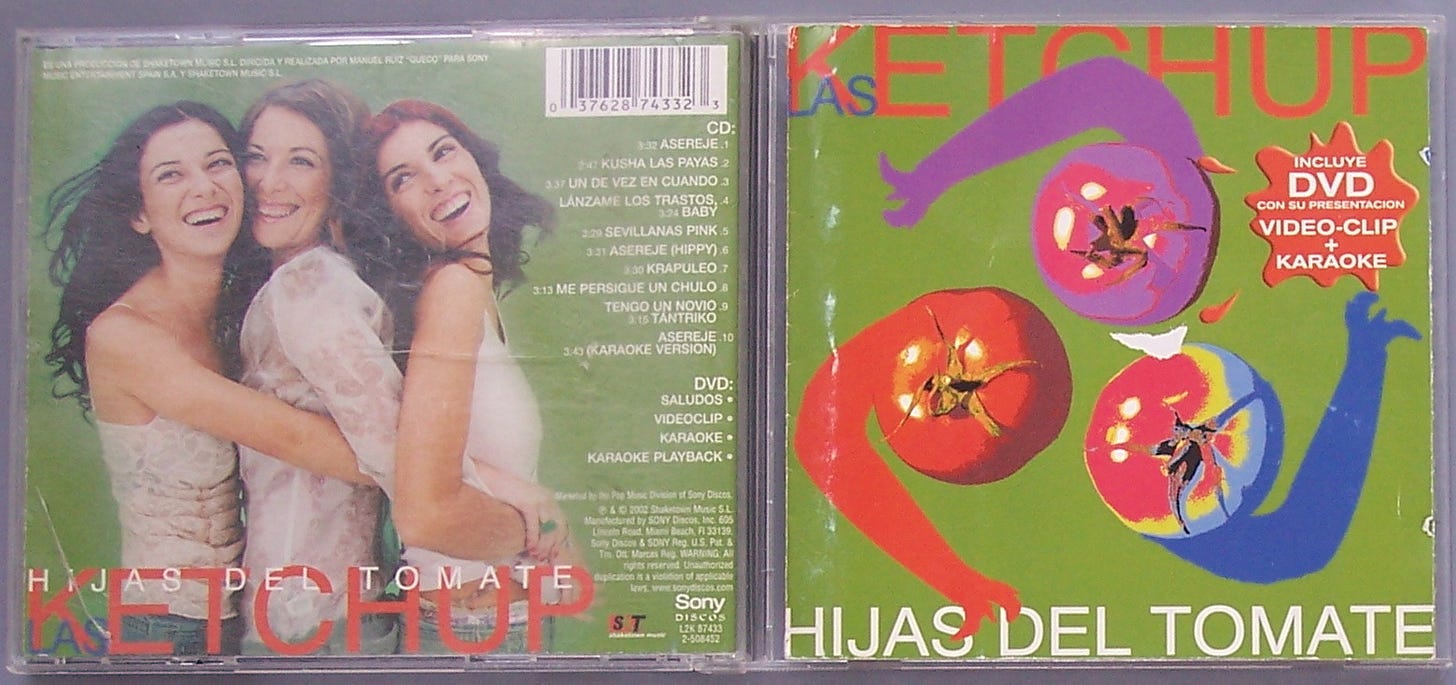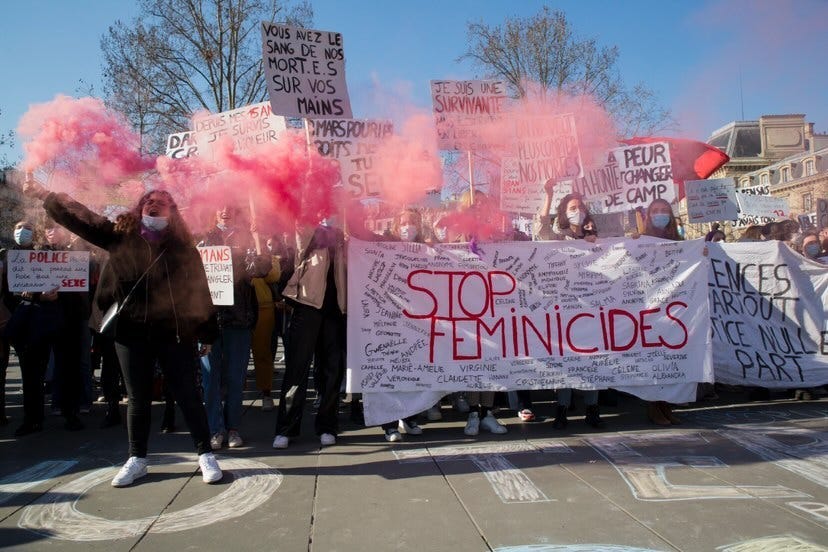Music in gibberish, femicide and beautiful leftovers

In 2002, I spent most of the summer dancing to Aserejé by Spanish pop group Las Ketchup, which will be forever remembered for its bizarre choreography. At the time I was oblivious to its meaning, but the song in fact describes an all-too-common experience: that of being constantly exposed to American music as a non-English speaker. It tells the story of a man called Diego who goes to a club and asks the DJ to play Rapper’s Delight by The Sugar Hill Gang. The nonsensical chorus (“aserejé-ja-dejé de jebe tu de jebere seibiunouva majavi an de bugui an de güididípi”) is him singing along to the lyrics he can’t understand. “This is something we do very often,” Lola Muñoz, one of the members of Las Ketchup, told the Peruvian TV channel Latina Noticias in 2017. “If you can’t speak English or whatever language the song is in, then you just hum along, you make it up. That’s what Aserejé is about.”
It wasn’t the first time a song explored the communication barrier between American music and its international audiences. In 1972, Prisencolinensinainciusol by Italian singer Adriano Celentano was intended to sound to its home audience as if it was sung in English with an American accent – but the lyrics are in fact deliberately unintelligible gibberish. “Ever since I started singing, I was very influenced by American music and everything Americans did,” Celentano told US radio station NPR. “I thought I would write a song which would only have as its theme the inability to communicate. And to do this, I had to write a song where the lyrics didn’t mean anything.”
English has dominated international music for, well, pretty much forever, placing American, British, Canadian, Irish, and Australian pop stars at the top of the charts around the world, thereby forcing everyone else to learn the language – be it to get a chance at making successful music, or just to understand the lyrics. France is one of the few countries that fought what it called the ‘Anglo-Saxon’ cultural invasion, with a 1994 law that said 40% of the music on French radio should be in French (it was brought down to 35% in 2016). But even French musicians have resorted to singing in English to attract an international audience.
Today the cultural landscape is more linguistically diverse than ever. Global pop culture is shifting away from the America-centred world, a trend that has been accelerated by streaming platforms, but there is also a sense that America has lost the prestige it once had. K-pop bands and Latin American artists have found unprecedented international success while singing in their mother tongues, but it’s not just music. If you subscribe to Netflix, chances are you’ve recently watched a Mexican, French or Icelandic show in the original language with subtitles. Even Galician, a regional language spoken by less than 2.5 million people, is now reaching the ears of audiences around the world via the screen, as I explore in this piece in the Guardian.
While English is unlikely to lose its role as the world’s lingua franca anytime soon, it’s clearly losing importance when it comes to culture, which is fuelling interest in other languages instead. In 2020, the year that saw a Korean film, Parasite, win Best Picture at the Oscars, Duolingo reported a sharp increase in users learning Korean, which it saw as “evidence of the pull of the entertainment industry on language-learning patterns”.
We are no longer looking to America (or the UK for that matter) for the next big cultural hit, and artists who were traditionally told to translate their work to sell to the US are finally demonstrating that they can be successful while staying true to their own language – and not just for the duration of a summer, as was the case for Aserejé and many other hits by international artists.
In a way, it only seems natural that we would at some point reach Anglo-Saxon fatigue and turn our attention to something else. By the time clubs are allowed to open their doors again, English speakers are likely to be confronted with more than one Aserejé moment. But don’t worry, just make it up as you go along, and hopefully, those Duolingo lessons will have paid off. - Julia

Word of the month: Femicide
The events of the past month felt like a turning point in the fight against femicide. The fact that Sarah Everard disappeared just a few days before International Women’s Day only added to the tragedy and injustice. But in the debate that followed this traumatic event, one crucial question arose: is the language we use to talk about violence against women still flawed?
It was the American author and educator, Jackson Katz, who opened our eyes to this systemic bias - how the way we use language conspires to keep the blame off men. We tend to talk about ‘how many women were raped on university campuses last year’ instead of ‘how many men raped women’, or ‘how many teenage girls got pregnant last year’ rather than ‘how many boys impregnated teenage girls’.
The term ‘femicide’ was first used in England in 1801 to signify ‘the killing of a woman’, and was then published in Wharton’s Law Lexicon in 1848. However, it wasn’t really used until the 1970s feminist movements, with author Diana Russell testifying at the first International Tribunal on Crimes against Women in Belgium, saying:
"We must realise that a lot of homicide is in fact femicide. We must recognise the sexual politics of murder. From the burning of witches in the past, to the more recent widespread custom of female infanticide in many societies, to the killing of women for ‘honor’, we realise that femicide has been going on a long time. But since it involves mere females, there was no name for it until Carol Orlock invented the word 'femicide.'”
It’s only in recent years that the term has become more widely used by feminist campaigners around the world. In Argentina, for example, where a femicide inspired the campaign #NiUnaMenos (‘not one [woman] less’), more and more, campaigners were using the word feminicidio to talk about gender violence.
The term replaced what traditionally used to be written off as a ‘crime of passion’: a romanticised - and genderless - phrasing that glorifies violence against women by framing it as an isolated case motivated by an emotional outburst.
But using the word ‘femicide’, and recognising it as a criminal offence, allows for a better understanding of the scale of the problem. Most Latin American countries have added femicide to their penal codes and two bills have been submitted to do the same in Belgium. We can now pinpoint the death of 146 women in France by a partner or ex-partner, or one woman every three days in the UK.
But we still have a long way to go. If you think of the phrase ‘crime of passion’, along with ‘Sarah was killed’ and ‘violence against women’ – where’s the subject? These are passive constructions that shove accountability off the group who perpetrated the violence and onto those experiencing it. As Katz points out, it is essentially a form of subtle but profound victim blaming. By calling rape a ‘women’s issue’, men are immediately excluded from the topic, ‘Oh, it’s a women’s thing’.
We speak fluent bias without realising it. And biased language includes expressions that demean or exclude people – in this case, the perpetrators. Unlearning it is a sure step towards meaningful change. - Aisling
What we’re reading
Do you speak therapist? Self-care, coping mechanisms, boundaries, toxic relationships, trauma. The language of mental health has made its way into our daily lives in ways that we don’t even realise, as Katy Waldman explores in this piece in the New Yorker. With the world in its current state, it’s not surprising that mental health issues are on the rise, and this is showing in our everyday lexicon.
Liberté, égalité, diversité. The French government has launched a new online dictionary to celebrate the “exceptional richness, diversity, creativity and constant evolution of the French language, as it is practiced today on all five continents.” While France is famously rigid about its language (hello Académie Française), the online Dictionnaire des Francophones is an effort to move with the times. French speakers around the world have been invited to contribute to the list of over 500,000 words and expressions from 52 countries, which are first considered by a panel of linguists.
Taking a leaf out of their book. We loved this list of “sustainable” expressions in different languages that encourage a better relationship with the environment. In Polish, Kto zjada ostatki ten jest piekny i gladki means “whoever eats the leftovers will be beautiful” (our kind of love language). The Italians have the expression fare la scarpetta – literally “to do the little shoe” – that refers to the piece of bread used to mop up the sauce left on your plate. Meanwhile, speakers of Mandarin have zhuan song, which means “passing on a gift you’ve received to someone else, preventing it from going to waste.” We’ve already adopted the Swedish word plogga (plogging) - “litter-picking while jogging” - so let’s hope more of these make their way into English too.
Lost in translation. Amanda Gorman’s poem ‘The Hill We Climb’ at Biden’s inauguration marked a significant cultural moment for Black people – so many were outraged when white writers were chosen to translate her work. The debate has exposed the lack of diversity in the world of literary translation. In a survey by the American Literary Translators Association last year, only 2% of 362 translators who responded were Black. Marieke Rejneveld quit after she was asked to translate the poem into Dutch, while the Catalan publisher dropped its white translator because he “was not suitable for the project”. Meanwhile, the Swedish and French publishers, for lack of Black translators, have hired famous Black musicians to translate the book instead.
If you would like to support this newsletter, you can buy us a cup of coffee here. And if this email was forwarded to you, click the button below to subscribe.
About us:
Aisling O'Leary is an Irish journalist based in London, where she works at The Telegraph's travel desk. You can follow her on Twitter @JournoAsho
Julia Webster Ayuso is a Spanish-British freelance journalist based in Paris. Her writing has appeared in TIME, The Guardian and Monocle among others. You can follow her on Twitter @jwebsterayusoWe love hearing from you. Email us with any feedback, random thoughts and suggestions for future newsletters: beyondwordsnewsletter@gmail.com
A big thank you to Stephen Glennon for his help with this issue and thank you to all of those who have donated on our Ko-fi page – your support is essential x





